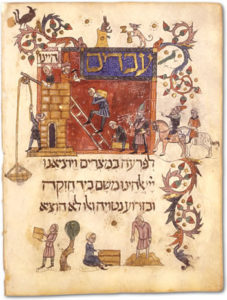 When Israel was in Egypt land. It has never been easy when two peoples live in the same country. It’s very difficult to share a county. Especially when one of the peoples thinks they are the superior one, and the thinks the other inferior. Or thinks that they are the masters, and the other people are their slaves, without rights, and that their lives can be trifled with, or ended, with impunity, without repercussions. The Egyptians wanted to end the situation by ending the existence of the Israelites. The Israelites only wanted to get out of Egypt. No one thought it possible to live together as equals.
When Israel was in Egypt land. It has never been easy when two peoples live in the same country. It’s very difficult to share a county. Especially when one of the peoples thinks they are the superior one, and the thinks the other inferior. Or thinks that they are the masters, and the other people are their slaves, without rights, and that their lives can be trifled with, or ended, with impunity, without repercussions. The Egyptians wanted to end the situation by ending the existence of the Israelites. The Israelites only wanted to get out of Egypt. No one thought it possible to live together as equals.
Let my people go. But it is not always possible to leave and go elsewhere. Neither the Jews nor the Palestinians can leave, or want to leave their homes. So we need to rephrase the demand. Let our peoples go. Let us free them from their mutual hatreds and suspicions, from the fear that each is out to destroy the other. The parting of the Red Sea was quite a miracle. Two peoples, living together as equals, the former oppressors and the formerly oppressed, would be an even greater miracle. And it wouldn’t require an outstretched arm, or signs and wonders. It starts with listening.
Oppressed so hard they could not stand. The first task of nonviolence is ending oppression, not by compulsion, but by making the oppressors end their oppression because they have no political or moral choices left. This is never easy, but the question of what to do next is even more difficult. In the fall of 1865, after the end of the Civil War, a convention of former slaves meeting in Charleston, SC, demanded “the right to their being,” and this is what the oppressed always want, an end to domination, and end to not having choices about their own bodies and their own lives. And then, forgiveness? The African American religious thinker asked “Can the mouse forgive the cat for eating him?” What’s done is done, and it is never done.
Go down Moses, and tell old Pharoh, let my people go. Neither Moses nor Pharoah are single people. Moses is everyone fighting oppression; Pharoh is everyone who tolerates the status quo. We are all a mixture of Moses and Pharoh. And let us assume, that Moses and Pharoh are both from the same people, that Moses are the protests in Tel Aviv and other cities, and Pharoh controls the Knesset. And what Moses is telling Pharoh is that we have to let go of what is no longer working. The protests are not only about the future of Israel’s Supreme Court. It is about giving the right of every Israeli, and every person living under Israeli sovereignty, to be able to choose their own destinies. And that is the ultimate meaning of letting my people go.